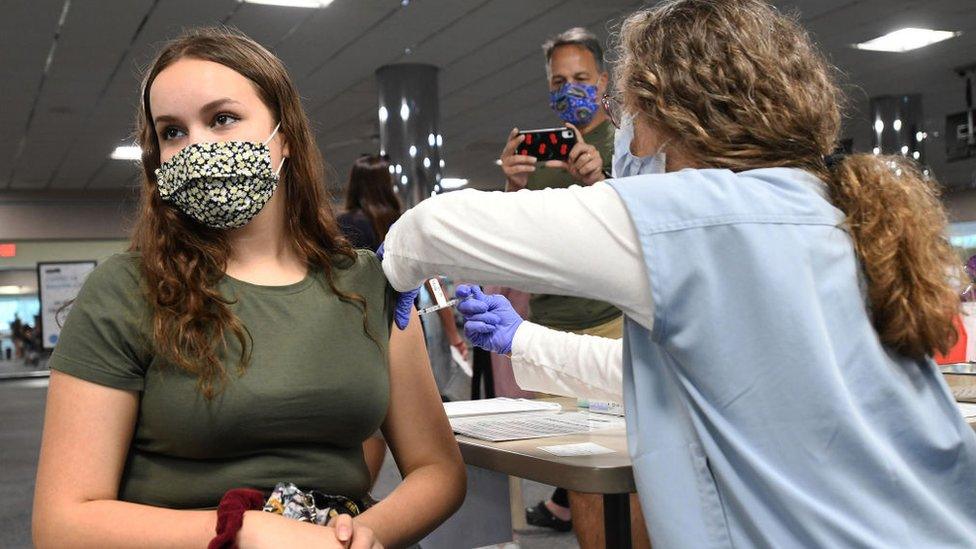Covid in Scotland: Almost 40% of 16 and 17-year-olds receive vaccine
- Published
- comments
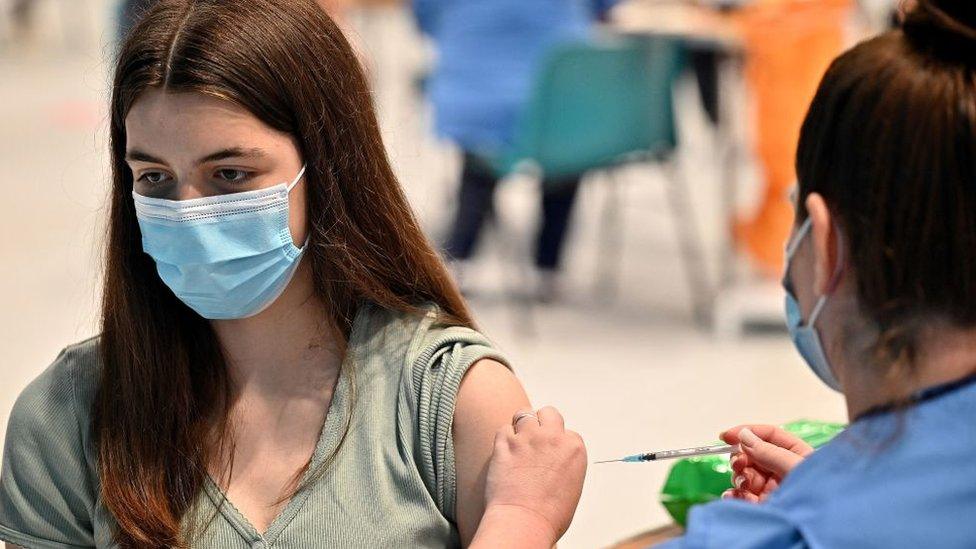
Almost 40% of 16 and 17-year-olds in Scotland have now received a first dose of a coronavirus vaccine.
Public Health Scotland figures show nearly 44,000 school age teenagers have had a jab, just a fortnight after vaccination was rolled out to the age group.
Prof Jason Leitch, said it was "absolutely terrific" that 39.6% had now received at least one dose.
"I'm very encouraged that they've done it so well and so quickly," he added.
Scotland's national clinical director told BBC Radio Scotland's Drivetime there was still 60% of the age group still to be vaccinated but more would have been jabbed on Monday and Tuesday.
Overall, 80.3% of over-18s in Scotland are fully vaccinated.
Despite that, new positive tests for Covid have increased rapidly in recent weeks, with daily figures now close to the peak levels seen in July.
Prior to the change in advice from the scientific body that advises the government, children over 12 were only able to get a jab if they had certain health conditions, lived with someone at high risk or were nearly 18.
While uptake figures in the youngest age group are encouraging, there was a similar high take-up in the first weeks after the vaccine was made widely available to 18 to 29-year-olds in June.
The rate has since slowed significantly. In the 18-29 group, 73.6% have had one vaccine so far, with 40.8% double jabbed.


Prof Leitch said he hoped that 16 and 17-year-olds would all be vaccinated within the coming weeks.
So far, 43,576 have received at least one jab, out of about 110,000 living in Scotland.
They will all be offered the Pfizer-BioNTech vaccine, as it is the only one that has been approved for those under-18 in the UK so far.
"We have supply, we have drop in clinics available to them, we just need to make it as convenient and as open for them as we possibly can."
He said the 18-29 year old group was "lagging a bit behind" those over 30, but the numbers were still "great".
"It's not been open [to 18-29 year olds] that long," he added.
Incentives
Asked whether he believed those who were not as keen to receive a vaccine should be offered an incentive, he said: "I don't mind incentives.
"If you want to give a pizza, or a bus pass or whatever then I'm entirely happy with that.
"I think we're in conversations with companies UK wide and here but I think it's relatively peripheral."
Prof Leitch added that behavioural scientists thought that the focus of communications should be on the altruism of vaccinations.
"What it does for you of course, but also what it does for your loved ones and those around you," he added.
But he added that there was definitely an incentive to be vaccinated in order to be able to "do stuff" like travel.
He said going to Ibiza or Orlando, for example, seemed unlikely without vaccination in the near future.
"The world is moving to a vaccination programme where certification or evidence might be required for that kind of thing.
"I don't think that should be the law necessarily in Scotland, but I don't mind if that's one of the reasons why young people want to come forward - if they want to have a holiday - if that causes them to be vaccinated, I'll take it."
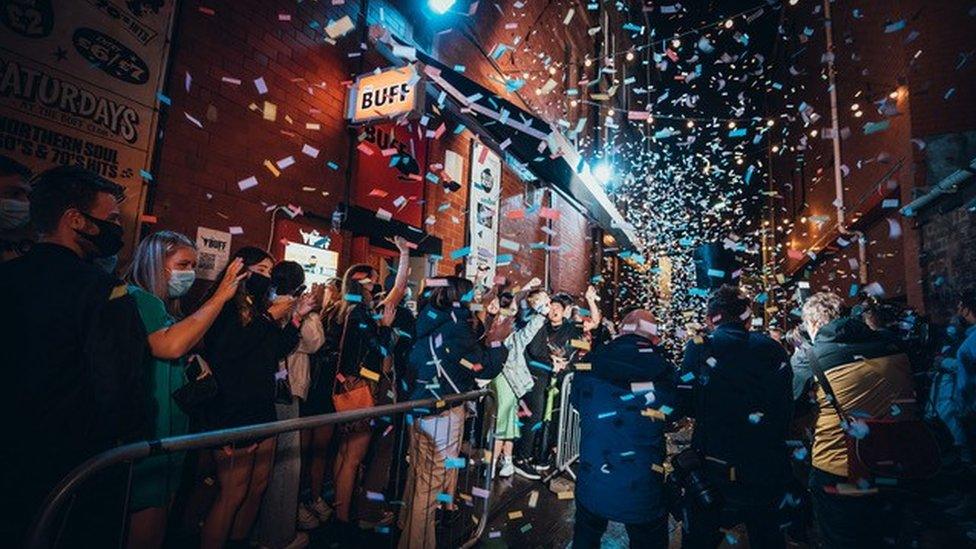
Nightclubs in Scotland reopened on 9 August after being closed since March 2020
The Scottish government has been cautious about using so-called vaccine passports to control access to services or venues, citing civil liberties issues.
Nicola Sturgeon has previously said she had not taken a decision on whether or not to require vaccine passports in any particular setting.
Last month, the first minister said, external that the arguments for requiring vaccination to allow entry to certain places "raises sensitive, ethical and equity considerations - not least because there are some people who can't get vaccinated because of health conditions" and so had to be "weighed up very carefully".
In England, the prime minister has said that proof of full vaccination will be required for entry to nightclubs and other venues where large crowds gather from the end of September.
Until then, clubs and similarly crowded venues are only encouraged to ask to show proof of vaccination, a negative test result or immunity.

Analysis by Marc Ellison, BBC Scotland data journalist
Drop-in vaccine clinics began for Scotland's youngest adults more than two weeks ago, just before the mass return to school
So, what do we know about uptake among 16 to 17-year-olds?
Well, the latest data, external tells us a few things.
Firstly, that uptake on the opening weekend of the drop-in clinics - 7 and 8 August - was relatively low.
On Friday 6 August 11.7% of all 16 and 17-year-olds across Scotland had had a first dose - these would have been youngsters in the at-risk category; those living with at-risk adults plus a number within three months of their 18 birthday.
But by Sunday, 8 August, this cumulative percentage had increased by just 0.6%.
Uptake increased significantly from Monday 9 August, with daily cumulative rises averaging 2.3% with a high of 3.1% on 12 August.
However, by the following week - presumably with many from this age group returning to school - the average increase had slowed down to 1.5%.
Currently 39.6% of 16 and 17-year-olds have had their first dose and the Scottish government has said that all within that small age bracket will have been offered a first dose by the end of next month.

How do you get the vaccine?
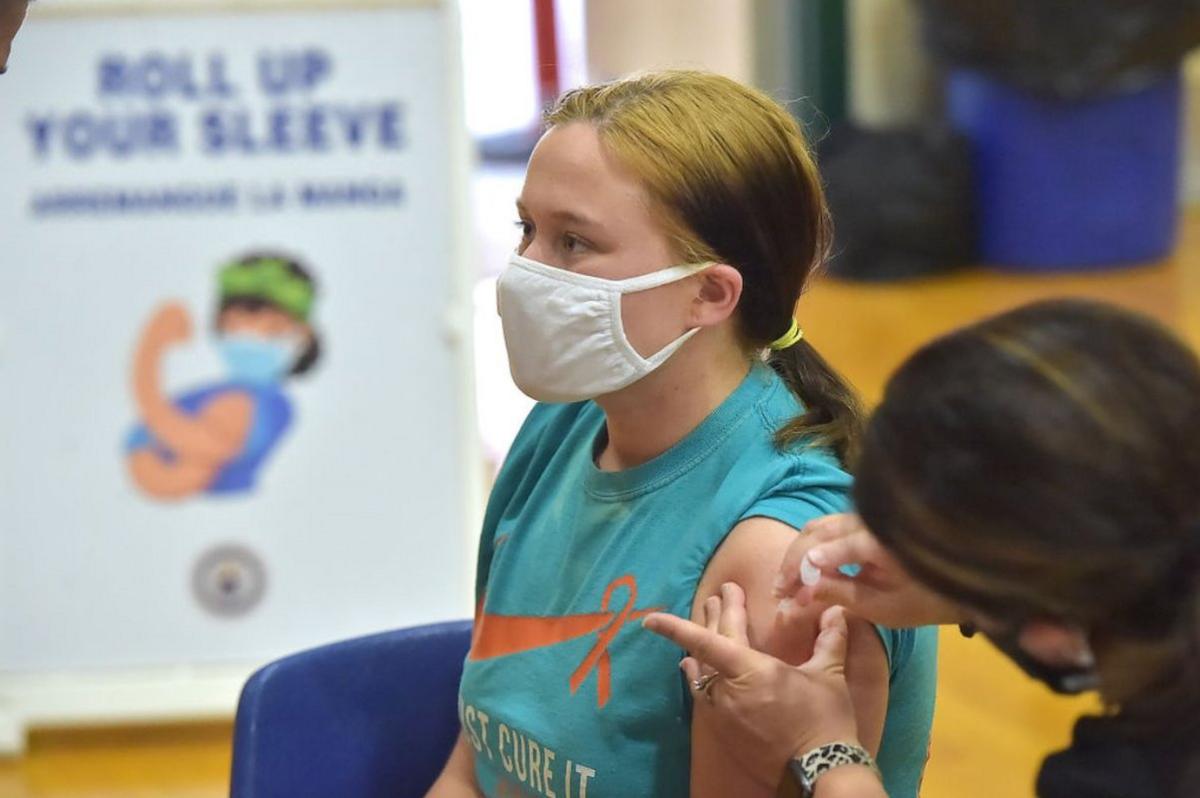
Teenagers in certain countries are taking up the offer of a Covid vaccine
From Friday 6 August, those who live on the mainland have been able to register their interest in receiving the vaccine at the NHS Inform website.
They are then sent an appointment by text or email.
Those who live in Shetland, Orkney and the Western Isles are being contacted by the health board and asked to attend clinics.
Drop-in clinics are also be available for 16 and 17-year-olds.
Those who do not register an interest or attend a drop-in clinic will be sent an invitation to attend an appointment through the post.
The Scottish government has said all 16-17-year-olds will be offered a first dose by late September.


- Published17 November 2021
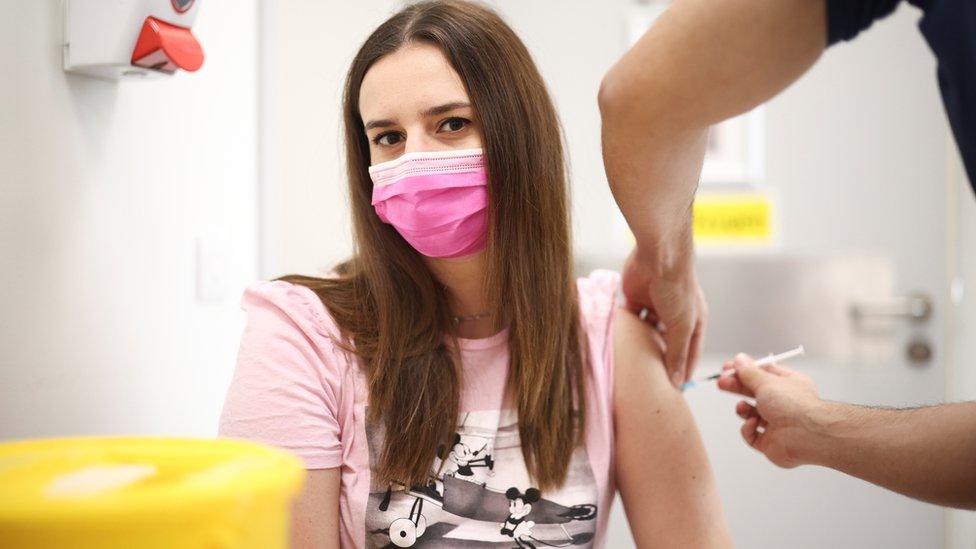
- Published7 August 2021
